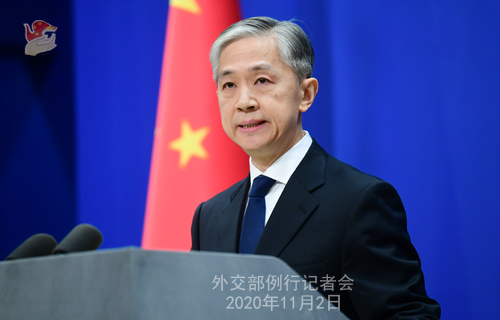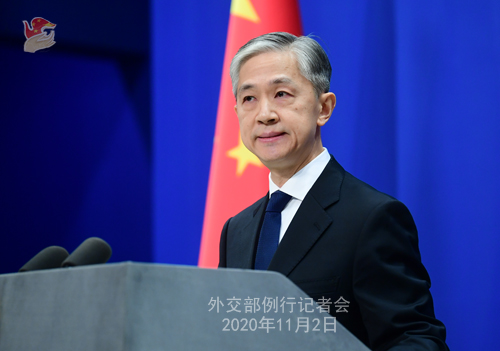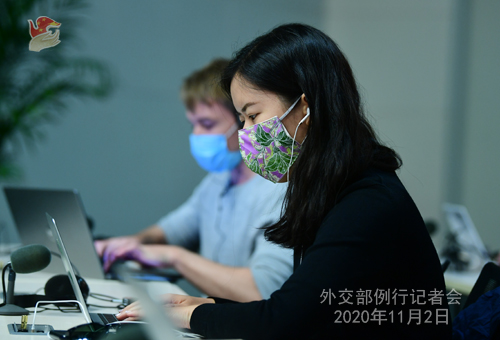| Foreign Ministry Spokesperson Wang Wenbin's Regular Press Conference on November 2, 2020 |
| 2020-11-02 21:24 |
|
CCTV: It is reported that Chinese experts held the first video conference with their international counterparts from the World Health Organization (WHO) to exchange views on the traceability of the COVID-19 virus. Can you confirm it and offer more details? Wang Wenbin: On October 30, as agreed by the two sides, Chinese experts and WHO international professionals held a video conference on the traceability of COVID-19. The Chinese experts outlined the progress of work in the areas of population, environmental, molecular, animal tracing and cold-chain transmission pathways of COVID-19. The WHO experts thanked their Chinese counterparts for their excellent work on the traceability of COVID-19, and briefed them on global scientific research in this field. The two sides agreed to continue their scientific exchanges and work for greater progress. WHO Director General Dr. Tedros and WHO Health Emergencies Program Executive Director Dr. Mike Ryan attended the conference briefly to deliver the message that WHO will fully support the global scientific and research cooperation on the traceability of the virus to better prevent and handle the pandemic. China will continue playing an active role in the global efforts to study the traceability and transmission routes of COVID-19 and working with the international community to contribute to global virus tracing and anti-epidemic cooperation. The tracing of the virus is an ongoing process that may involve many countries and places. We hope all relevant countries will adopt a positive attitude and cooperate with WHO like China does. Beijing Daily: A U.S. district judge in Pennsylvania ruled on October 30 to halt the U.S. Commerce Department's TikTok ban that was set to take effect on November 12. What is your comment? Wang Wenbin: I have noted relevant reports. China consistently opposes the U.S. bully-like abuse of the concept of national security and its state power to crack down on foreign companies. We also noticed the judge's words that the administration's phrasing for the national security concerns the app posed was "hypothetical". We hope the US side will faithfully respect the principles of the market economy and fair competition, observe international trade rules, and ensure an open, fair, unbiased and non-discriminatory business environment for all foreign companies in the United States. Xinhua News Agency: Following President Xi Jinping's announcement that China will strive to become carbon neutral by 2060, Japan and South Korea have announced their own targets to achieve carbon neutrality. Patricia Espinosa, executive secretary of the U.N. Framework Convention on Climate Change (UNFCCC), welcomed these pledges on October 30, saying that pledges by China, Japan and the ROK are extremely important signs of leadership in reviving global efforts to tackle climate change and a significant contribution towards bringing the international community in line to achieving the goals under the Paris Agreement, which had boosted hopes that more countries would take bolder climate action. What's your comment? Wang Wenbin: "One can walk fast when traveling alone and walk a long distance when traveling with friends." China welcomes relevant countries' announcement of their carbon neutrality goals, and applauds the UNFCCC Secretariat's important role in advancing multilateral governance on climate change led by Ms. Espinosa. This year is the fifth anniversary of the conclusion of the Paris Agreement. The international community is consolidating efforts, enhancing ambitions for the global fight against climate change, and pooling ideas and strength for dealing with common challenges. The recently concluded fifth plenary session of the 19th Central Committee of the Communist Party of China reviewed and adopted proposals for the formulation of the 14th Five-Year Plan (2021-2025) for National Economic and Social Development and the Long-Range Objectives Through the Year 2035. The session raised a set of long-range objectives for China to basically achieve socialist modernization by 2035, including achieving notable results in green transformation of production and lifestyle, keeping CO2 emissions stable and decreasing after peaking, fostering fundamentally better ecological environment, and basically realizing the goal of building a beautiful China. China is determined in handling climate change, sincere in cooperation and takes concrete actions to implement our commitments. China will continue doing our best to make greater contribution to the global fight against climate change. In an open spirit, we also welcome more countries joining our league to protect the Earth, our common home.
Reuters: An extended visa renew deadline for Chinese journalists in the USA is set to expire in early November. If the deadline passes and the visas are not renewed, how will the Chinese government respond? Will it retaliate against U.S. journalists in China? Wang Wenbin: As I understand, some Chinese journalists were notified last week that their applications for visa extension got approved by the U.S. side, valid from August 4 to November 4. In other words, the actual validity period of their visas was less than one week. For some, it's only three days. They were compelled to immediately file new extension applications. Besides, some Chinese journalists have yet to receive any clear reply of approval from the U.S. side. The United States even raised an unreasonable demand that the journalists cannot report news during the application period. All this has hurled Chinese journalists working and living in the United States into enormous uncertainties. The merits of what happened in the media sector between China and the United States is very clear. China has made clear its concerns and demands to the U.S. side through bilateral diplomatic channels. China will take all necessary measures to safeguard the legitimate rights and interests of Chinese journalists in line with the principle of "word for word and action for action". We once again urge the U.S. side to give up illusions immediately and stop its political persecution and suppression against Chinese journalists. Otherwise, China will resolutely take reciprocal measures. This is a prior notification. CCTV: A 6.9-magnitude earthquake hit the Aegean Sea on October 30, killing 76 and injuring 962 in Turkey, while two people died and more than 10 were injured in Greece. Can you comment on this? Were there any Chinese citizens injured or killed in the earthquake? Wang Wenbin: China has been following the news of casualties due to the earthquake in the Aegean Sea. We deeply mourn the victims and express sincere sympathies to the bereaved families and the injured. The Chinese embassies in Turkey and Greece activated the emergency mechanism at the earliest time possible and contacted relevant sides to verify information. So far, no Chinese casualties have been reported. Our ministry and the Chinese embassies in Turkey and Greece will continue closely following the situation on the ground and providing essential assistance to Chinese citizens in a timely manner. Bloomberg: Australia says that Chinese customs officers are delaying imports of some premium shellfish products, according to a Bloomberg news report. Australia has been successful in tackling the coronavirus, especially in Western Australia, which is the country's biggest lobster-exporting state. So my first question is, why then is Australia the only country facing delays like this on shellfish products? Separately, there have been two further reports, one from SCMP saying that China is expected to introduce bans on imports of Australian copper ore, copper concentrate and sugar this week. In addition, Reuters reports that China has rejected Australia's appeal to remove import tariffs on barley. So all aspects of this question basically refer to delays on imports or bans on imports of Australian goods. With so many examples that I've just cited, it's quite hard not to see this as some form of retribution. So I'd like to ask you about these three areas, in particular the premium shellfish products. Wang Wenbin: On your first question, According to law, the Chinese customs takes inspection and quarantine measures on imported seafood products and releases them after finding they meet the criteria. This practice is in line with pertinent laws and regulations, and protects the safety of Chinese consumers buying imported food. Regarding your second question, China conducts friendly cooperation with other countries based on mutual respect, equality and mutual benefit. We believe a sound and stable China-Australia relationship serves the fundamental interests of both peoples. In the meantime, mutual respect is the foundation and guarantee of practical cooperation between countries. We hope Australia can do more things conducive to mutual trust, bilateral cooperation and the spirit of China-Australia comprehensive strategic partnership, and bring the bilateral relations back to the right track as early as possible.
Phoenix Satellite TV: According to aviation monitoring software, U.S. Secretary of State Pompeo flew to Japan across Chinese territorial space after concluding his visit to Vietnam. Some analysts said that it is highly likely that the flight was approved by China and that such interaction between China and the United States was a positive sign at a time of tension between the two sides. Does the foreign ministry have any comment on this? Wang Wenbin: The Chinese side reviews matters relating to the overflight of foreign aircraft through Chinese territorial space in accordance with pertinent laws and regulations. Shenzhen TV: The U.S. State Department's new human rights webpage accuses China of disrespecting human rights on issues related to Xinjiang, Tibet, Hong Kong and religious freedom. Do you have any response to this? Wang Wenbin: When viewing and discussing human rights, one should first have a comprehensive and objective understanding of the human rights in a country or region. Pursuing a people-centered vision on human rights, the Chinese government has achieved the historic progress of lifting almost 1.4 billion people out of poverty, bringing them subsistence and then a life of moderate prosperity. The Chinese people's life expectancy increased from 35 to 77 years. More than 700 million people were pulled out of poverty. China has built the world's biggest systems of education, social security, medical care and institutions of democracy at the primary level. The Chinese people's rights to speech and religious freedom, as well as the ethnic minorities' right to participate in the governance of state affairs, are protected according to law. The Chinese government puts life front and center, takes the most rigorous and thorough measures to prevent and contain the virus, makes the best effort possible to protect people's lives, value and dignity, and has achieved major outcomes in epidemic prevention and control. Recently China was elected to the UN Human Rights Council for the fifth time, demonstrating the international community's high recognition of China's progress in the human rights cause and proactive participation in global human rights governance. The United States, turning a deaf ear to those basic facts and its own problems of serious human rights violation, has been doing all it can to slander China's human rights. China firmly rejects that. In the United States there have been numerous scandals of racial discrimination, police brutality and prisoner abuse. It arbitrarily intimidates and sanctions others, and has launched wars that left hundreds of thousands of innocent civilians injured and dead, millions displaced, and tens of millions lacking food or medicine. The United States' behavior of duplicity reveals its true aim of interfering in other countries' internal affairs rather than protecting human rights. On the issue of human rights, the United States should earnestly reflect on its own deeds and correct its many problems. It is in no position and has no right to lecture others on human rights, still less should it become a source of political virus and a transmitter of disinformation. Reuters: Again on trade with Australia. According to media reports, China has banned the imports of timber from Australia's state of Queensland. Can you confirm if this is the case? Wang Wenbin: The Chinese customs has since January detected many cases of live pests in timber imported from Australia, such as longicorn and buprestid beetles. These live pests, if allowed into China, will gravely endanger China's forestry production and ecological security. In accordance with China's quarantine laws and regulations, China treated these logs with pesticides, and following international standards, China has notified the Australian side of the cases and asked Australian to investigate and take measures to prevent recurrence. We hope that the Australian side will take effective measures to strengthen export quarantine and ensure the exported timber meet China's quarantine requirements.
*********************************************************** This question was raised after the press conference: U.S. Assistant Secretary of State David Stilwell made a speech on October 30 to slam the CPC and China's united front work. Do you have any response to this? Wang Wenbin: U.S. Assistant Secretary of State David Stilwell's speech is filled with distortion and discredit of the CPC and the united front work. His words are nothing but political lies. The CPC wholeheartedly serves the people and sees that everything is for the people and everything relies on the people. The CPC led the Chinese people in achieving remarkable progress in the revolution and national development, and they have won the people's wholehearted endorsement. Attempts to drive a wedge between the CPC and the Chinese people are doomed to fail. The fundamental principle of the CPC-led united front is to promote solidarity and cooperation between the CPC and all political parties, social strata, ethnic groups, organizations and circles. By enhancing consensus, coordinating relations and making more friends with deeper friendship, we can pool efforts and ideas from all to work for national prosperity, social harmony and people's wellbeing. China always promotes inclusiveness and mutual learning between civilizations, as well as "harmonious co-existence, win-win cooperation and peaceful development" between countries. By uniting overseas Chinese including our students, we are fully leveraging their role as a bridge between China and other countries that contributes to people-to-people and cultural exchange and friendly ties. What China has done is completely above-board. China has long been pursuing an independent foreign policy of peace and committed to the path of peaceful development. We never seek hegemony or expansion. That's why China has so many friends all over the world. The label of "infiltration" and "threat" can never be pinned on China. The international community sees it very clearly. Recently some U.S. officials have been shouting themselves hoarse to slander China with the intention to shift the blame. However, lies are lies, and repetition never turns a lie into truth. We urge those in the United States to stop spreading rumors against China or playing the despicable yet ineffective tricks, because their lies are already seen through by the world. |
| |||||||||||||||
|
|||||||||||||||





